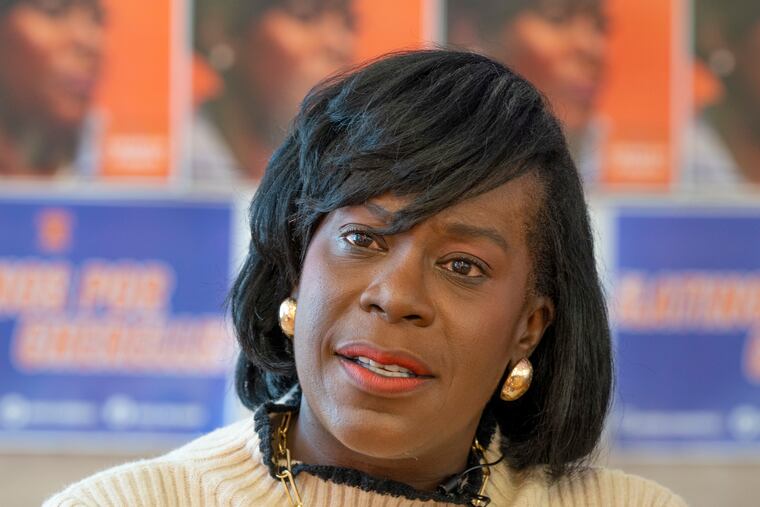Mayor Cherelle Parker racked up a $1 million campaign payroll — but it’s not clear who got paid
“It violates the spirit of campaign finance reporting," said Lauren Cristella, president of the good government group Committee of Seventy. "It’s why we have these laws in the first place."

Mayor Cherelle L. Parker spent nearly a million dollars in campaign funds on salaries and benefits for the staffers who helped her clinch the mayoral election last year.
But, today, it’s not clear who received that pay.
Parker’s campaign and transition committee took advantage of a gray area in state and city campaign-finance laws by filing financial reports that list staff costs as withdrawals by third-party payroll services, rather than payments to specific people. Those companies then cut paychecks to the staffers.
The practice, which other local candidates have used, means that while miscellaneous campaign costs were itemized — like advertising, literature, and a $11.12 Wendy’s meal — payments to her closest staffers were not.
When asked by The Inquirer to identify staff members and their pay, the campaign declined. Parker’s campaign attorney Timothy Ford, of Dilworth Paxson, said the financial disclosures met the letter of the law.
“When the campaign pays a vendor, the campaign isn’t required to disclose how the vendor spent the money — whether it went to the vendor’s payroll or overhead or inventory, or even to a subcontractor that actually performed the work,” Ford said.
But Lauren Cristella, president of the good-government group Committee of Seventy, said that while Parker’s expense reports followed campaign-finance rules, the growing practice of campaigns reporting payments to third-party services instead of to individuals undermines the intent of the rules by obfuscating the recipients of the funds.
“It violates the spirit of campaign-finance reporting,” Cristella said. “It’s why we have these laws in the first place. Constituents and residents deserve to know who is influencing the mayor and her administration, whose voices are at the table at the beginning of her administration. That’s why transparency rules are important.”
» READ MORE: Mayor Parker considers bringing more city workers back to the office
The size of Parker’s campaign staff and individual employee salaries weren’t made public, but outside consultants who were hired as contractors are listed, and some members of her campaign staff are known. Campaign manager Sinceré Harris and senior adviser Aren Platt were the architects of her historic win and now serve as deputy mayors. Several other staff members, including political director Neftali Ramos and deputy campaign manager John Dolan, now work in the administration — and their city-funded salaries are public record.
Their campaign pay, however, is unknown because the campaign only lists payments to two payroll vendors, Paychex and Payroll Data Services, which then paid campaign staffers.
Other mayoral candidates who ran against Parker last spring, including former Councilmember Allan Domb and grocer Jeff Brown, both disclosed some similar withdrawals by Paychex on their expense forms, as did Parker’s predecessor, former Mayor Jim Kenney, during his 2019 reelection campaign.
» READ MORE: Mayor Cherelle Parker just made 10 appointments, but some top jobs remain up in the air a month into her tenure
State campaign-finance rules require campaigns to disclose “each and every expenditure,” along with the date of the transaction, as well as the name and address of the person to whom checks were made. Campaigns also must disclose the purpose of each payment.
In the past, Philadelphia’s Board of Ethics, which crafts and enforces local campaign finance rules, has expanded regulations to discourage the aggregation of campaign expenses.
In 2021, after a growing number of campaigns began reporting large campaign expenses paid using credit cards as lump-sum payments, the board amended its regulations to make clear that campaigns must “disclose and itemize each purchase made with such a card, not merely a lump-sum payment.”
But the Board of Ethics hasn’t specifically addressed payroll services. A representative for board declined to comment.
Adam Bonin, an election attorney who worked for one of Parker’s Democratic primary opponents, former Councilmember Helen Gym, said that despite the gray area, campaigns sometimes voluntarily list individual staff payments in the interest of transparency.
“Many campaigns will disclose it regardless, because it’s not worth fighting about it,” he said.
Cristella said voluntary compliance isn’t sufficient, and that the rules should be clarified.
“We would call on the Ethics Board to consider implementing requirements to disclose campaign payroll payments, or breakdowns of those payments,” she said. “We should strive for the best when it comes to campaign-finance transparency.”